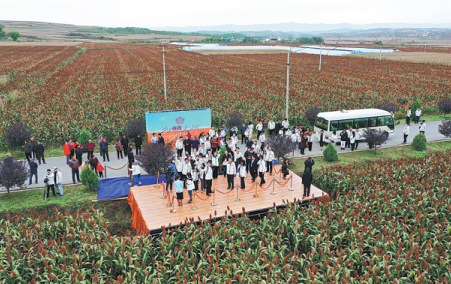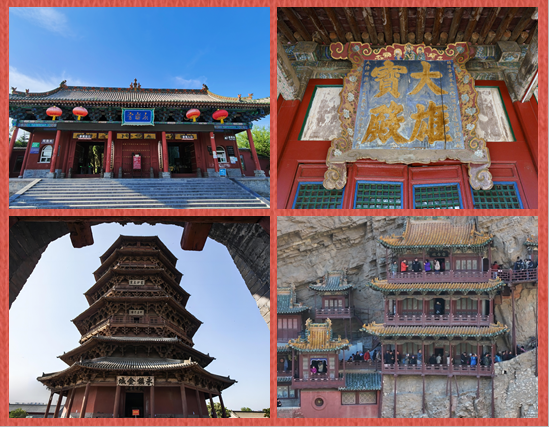Journalists treated to tour of baijiu brand's farms
Updated: 2021-10-22

Journalists visit a Xinghuacun Fenjiu grain farm in Qinxian county, Shanxi province. [Photo by Liu Tong for China Daily]
For many old brands in China, their association with traditional cultures and values has helped them shine to this date.
This is also the case with Xinghuacun Fenjiu Group, a time-honored distillery company based in the city of Fenyang in Shanxi province.
During their tour of the company on Oct 10-11, a group of journalists from the country's major media outlets found that emphasizing quality in every link of operations is the core value that this renowned baijiu, or white liquor, producer has insisted on from the very beginning. It's the secret behind the company's long-term prosperity.
Many people believe Xinghuacun became a household name mainly because of a poem called Qingming, written by Tang Dynasty (618-907) poet Du Mu. In the poem, Du described his mood during his trip on Qingming, or Tomb Sweeping Day, in April. In Chinese, Xinghuacun literally means apricot flower village.
It is unknown whether the Xinghuacun brand had any realistic connection with the poem, as the company was established in 1949 after the merger of several local old distillery brands.
However, the journalists learned much about the company from their tour, which they said was a trip to help them understand how traditional values are still upheld by the group and to make them believe Xinghuacun Fenjiu is a "living fossil witnessing the development of China's baijiu industry".
The moment they arrived at the company, the journalists were told their schedule began by visiting "the first link of its production and quality chain".
When they were guessing what that "first link" was, the journalists were led to an expansive sorghum farm.
Li Qiuxi, board chairman of the group, said, "Unlike many producers who view buying raw materials as the first link of production, our operations begin from sorghum farming."
He explained operating farms was a common practice among many prestigious baijiu producers in the old times, which allowed them to control product quality from the very beginning.
Aiming for a revival of the old baijiu brand, Xinghuacun Fenjiu began including its grain farming base development in its strategic growth plan in 2009, according to Li.
The board chairman added that the company currently operates more than 70,000 hectares of grain farms in Shanxi and the Inner Mongolia autonomous region, as well as in Jilin and Hebei provinces.
Operating its own farms can also help the company cultivate and grow the best breeds suitable for making baijiu, according to Chang Jianwei, deputy general manager of Xinghuacun Fenjiu.
Li said the company has a very complicated procedure for quality control, from grain planting to distilling.
"From growing grain, our production has to go through 36 monitoring points and 183 checks. It also has to meet 2,182 standards," Li said.
When talking about the origin of Xinghuacun Fenjiu and its local predecessors, the board chairman showed journalists the Fenjiu Museum, where items of archaeological discoveries were on display.
Archaeologists found an ancient alcoholic beverage production site in the location of the company. Unearthed production utensils revealed that the site has a history of about 6,000 years of production.
Wang Pei contributed to this story.



